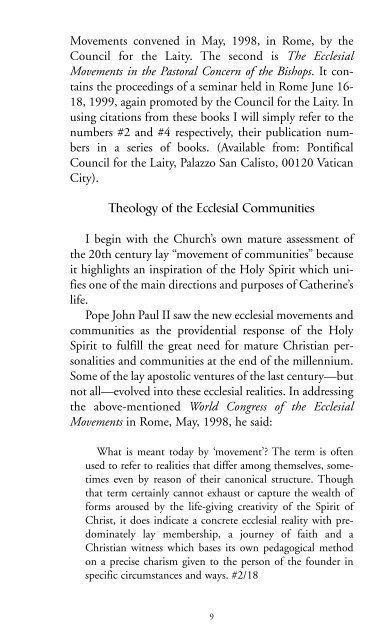Robert_Wild_-_Catherine_Doherty_Servant_of_God
Robert_Wild_-_Catherine_Doherty_Servant_of_God
Robert_Wild_-_Catherine_Doherty_Servant_of_God
Create successful ePaper yourself
Turn your PDF publications into a flip-book with our unique Google optimized e-Paper software.
Movements convened in May, 1998, in Rome, by the<br />
Council for the Laity. The second is The Ecclesial<br />
Movements in the Pastoral Concern <strong>of</strong> the Bishops. It contains<br />
the proceedings <strong>of</strong> a seminar held in Rome June 16-<br />
18, 1999, again promoted by the Council for the Laity. In<br />
using citations from these books I will simply refer to the<br />
numbers #2 and #4 respectively, their publication numbers<br />
in a series <strong>of</strong> books. (Available from: Pontifical<br />
Council for the Laity, Palazzo San Calisto, 00120 Vatican<br />
City).<br />
Theology <strong>of</strong> the Ecclesial Communities<br />
I begin with the Church’s own mature assessment <strong>of</strong><br />
the 20th century lay “movement <strong>of</strong> communities” because<br />
it highlights an inspiration <strong>of</strong> the Holy Spirit which unifies<br />
one <strong>of</strong> the main directions and purposes <strong>of</strong> <strong>Catherine</strong>’s<br />
life.<br />
Pope John Paul II saw the new ecclesial movements and<br />
communities as the providential response <strong>of</strong> the Holy<br />
Spirit to fulfill the great need for mature Christian personalities<br />
and communities at the end <strong>of</strong> the millennium.<br />
Some <strong>of</strong> the lay apostolic ventures <strong>of</strong> the last century—but<br />
not all—evolved into these ecclesial realities. In addressing<br />
the above-mentioned World Congress <strong>of</strong> the Ecclesial<br />
Movements in Rome, May, 1998, he said:<br />
What is meant today by ‘movement’ The term is <strong>of</strong>ten<br />
used to refer to realities that differ among themselves, sometimes<br />
even by reason <strong>of</strong> their canonical structure. Though<br />
that term certainly cannot exhaust or capture the wealth <strong>of</strong><br />
forms aroused by the life-giving creativity <strong>of</strong> the Spirit <strong>of</strong><br />
Christ, it does indicate a concrete ecclesial reality with predominately<br />
lay membership, a journey <strong>of</strong> faith and a<br />
Christian witness which bases its own pedagogical method<br />
on a precise charism given to the person <strong>of</strong> the founder in<br />
specific circumstances and ways. #2/18<br />
9


